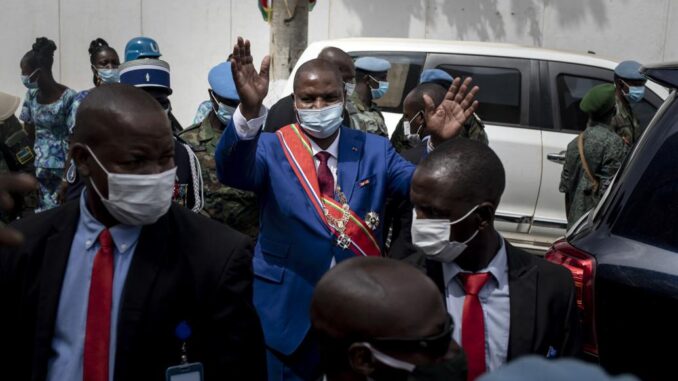
The President of Burundi was on hand, as were the Prime Ministers of Rwanda, Cameroon and Gabon, while Angola, Congo, Chad and Equatorial Guinea were represented at the ministerial level. On the DRC side, it was the President of the National Assembly who made the trip.
It was with emotion and humility “in the face of the magnitude of the task,” as he put it, that Faustin-Archange Touadéra was sworn in at the National Assembly on Tuesday morning, March 30. Not surprisingly, one theme dominated his inaugural speech: the return to security. “My wish is that, at the end of this mandate, there will no longer be any armed group active on the national territory,” said the head of state. Another promise was to fight against impunity. “It will be,” he said, “the backbone of my mandate. ”
To this end, he promised to work with all citizens, regardless of their political, ethnic or religious affiliation and reiterated his commitment to organize a dialogue soon, because, according to him, “the opposition has a role to play in anchoring our democracy,” believes Faustin-Archange Touadéra.
The head of state also thanked his foreign partners at length for their support during this period of crisis, including – and this is notable – the Central African Republic’s neighbors, with whom relations are notoriously delicate. None of them were represented at the level of Head of State for this ceremony.
Earlier, in her speech, the president of the Constitutional Court had invited the re-elected head of state to strengthen cooperation with his neighboring countries, in mutual respect. Daniele Darlan, who also, during an applauded speech, asked the president not to listen to the sirens of those who will try “to take you away from the essential, to take you away from the people who are your strength. ”
The President of the Constitutional Court recalled the “great challenges” that await President Touadéra. The first of these challenges, and not the least, is to re-establish the security and territorial integrity of the Central African Republic. The counter-offensive led by the national army and its allied forces has enabled the rebels to be driven out of most of the towns they took control of in December, but the war is not over and the positions remain precarious.
Another challenge for a lasting return to peace is to fight against the impunity that fuels the cycles of violence. In this regard, the Head of State promises “profound reform of the justice sector. On the political front, Faustin Archange Touadéra will have to bring people together. In addition to the armed groups, the opposition continues to challenge his re-election. The country’s main coalition of opponents boycotted his inauguration. He repeated his promise to hold a national dialogue soon. But its contours still seem uncertain.
On the economic and social front, too, there is a sense of urgency. Despite the country’s wealth, the World Bank estimated last year that more than 70% of the Central African population lives below the poverty line. The new crisis that began in December has only worsened the situation.
